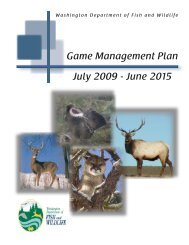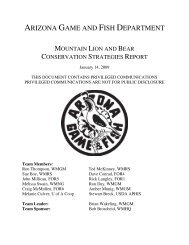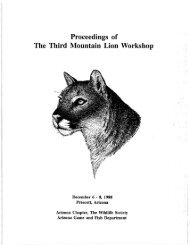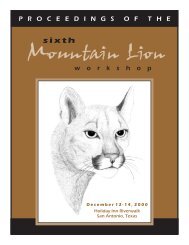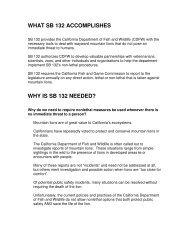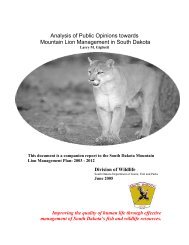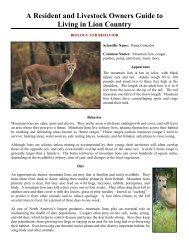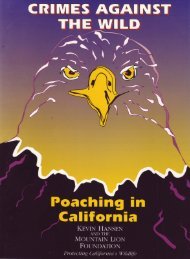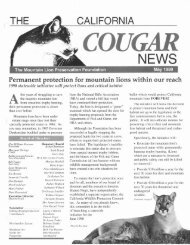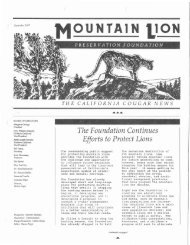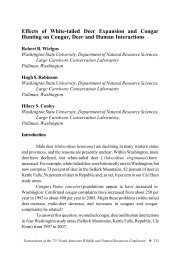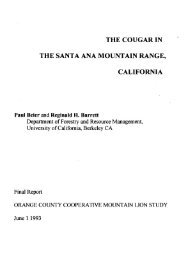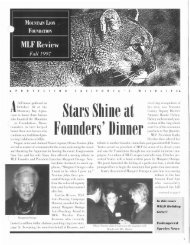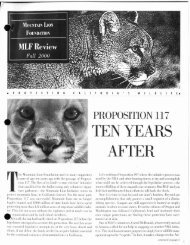Proceedings of the Ninth Mountain Lion Workshop - Carnivore ...
Proceedings of the Ninth Mountain Lion Workshop - Carnivore ...
Proceedings of the Ninth Mountain Lion Workshop - Carnivore ...
Create successful ePaper yourself
Turn your PDF publications into a flip-book with our unique Google optimized e-Paper software.
Studying Public Perceptions and Knowledge <strong>of</strong> Cougars in Washington<br />
as a Precursor to Outreach and Education Planning<br />
Chris Morgan Insight Wildlife Management, PO Box 28656 Bellingham, WA 98228,<br />
USA chrismorgan@insightwildlife.com<br />
Jim Harmon Dept. Environmental Studies, 217 Arntzen Hall, Western Washington<br />
University, Bellingham, WA 98228, USA jim.harmon454@gmail.com<br />
Donald A. Martorello Bear, Cougar and Special Species Section Manager, Washington<br />
Department <strong>of</strong> Fish and Wildlife, 600 Capitol Way North, Olympia, WA 98501,<br />
USA martodam@dfw.wa.gov<br />
ABSTRACT Cougar managers are frequently subject to political pressures that are<br />
influenced by public perceptions. Consequently, managing cougars increasingly<br />
demands a focus on human dimensions. To that end, Washington Department <strong>of</strong> Fish<br />
and Wildlife (WDFW) and Insight Wildlife Management conducted a public opinion<br />
survey in Washington in 2008. The objective <strong>of</strong> <strong>the</strong> survey was to better understand <strong>the</strong><br />
public’s perceptions <strong>of</strong> cougar management, identify information gaps, and define<br />
effective outreach methodologies. The survey instrument included questions about <strong>the</strong><br />
ecological role <strong>of</strong> cougars, cougar behavior, human-cougar conflict, availability <strong>of</strong><br />
educational materials, and preferred <strong>the</strong>mes for education programs. Using a random<br />
sampling telephone survey method, we obtained results from over 800 individuals, and<br />
conducted a stratified sub-sample in areas with a higher than average frequency <strong>of</strong><br />
human-cougar conflicts. We present <strong>the</strong> results <strong>of</strong> <strong>the</strong> survey and compare data from<br />
similar surveys in o<strong>the</strong>r states. Ultimately, <strong>the</strong> survey will be used to develop a cougar<br />
outreach and education plan for WDFW. We present preliminary ideas for this education<br />
plan based upon results from <strong>the</strong> public opinion survey and o<strong>the</strong>r successful carnivore<br />
outreach projects.<br />
<strong>Proceedings</strong> <strong>of</strong> <strong>the</strong> <strong>Ninth</strong> <strong>Mountain</strong> <strong>Lion</strong> <strong>Workshop</strong><br />
188



